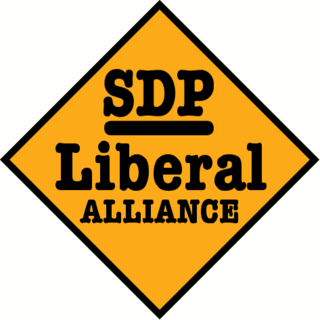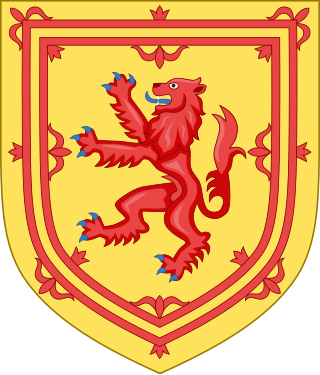
The 1983 United Kingdom general election was held on Thursday 9 June 1983. It gave the Conservative Party under the leadership of Margaret Thatcher the most decisive election victory since that of the Labour Party in 1945, with a majority of 144 seats and the first of two consecutive landslide victories.

The SDP–Liberal Alliance was a centrist and social liberal political and electoral alliance in the United Kingdom.

The Liberal Party is a liberal political party in the United Kingdom that was founded in 1989 as a continuation of the original Liberal Party by members who opposed its merger with the Social Democratic Party (SDP) to form the Liberal Democrats. The party holds five local council seats. The party promotes a hybrid of both classical and social liberal tendencies.

Dick Taverne, Baron Taverne, is a British politician and life peer who served as Member of Parliament (MP) for Lincoln from 1962 to 1974. A member of the Liberal Democrats, he was a Labour MP until his deselection in 1972, following which he resigned his seat and won the subsequent by-election in 1973 as a Democratic Labour candidate.
John Cameron Cartwright is a former politician in the United Kingdom. He was a Labour and then an SDP Member of Parliament (MP) representing Woolwich East then Woolwich from the October 1974 general election to the 1992 election.

Cambridge University Liberal Association (CULA) is the student branch of the Liberal Democrats for students at Cambridge University.

The Social Democratic Party (SDP) is a political party in the United Kingdom established in 1990. Ideologically, the SDP combines social conservatism with centre-left economic policy and support for a social market economy alongside Euroscepticism. Founded by Jack Holmes, it has been led by William Clouston since 2018.

The Social Democratic Party (SDP) formed in 1988 was a political party in the United Kingdom led by David Owen, which lasted for only two years. A successor party to the original Social Democratic Party (SDP), it was known informally as the 'continuing' SDP.
Christopher Brocklebank-Fowler was a British politician. In 1981, he defected to the Social Democratic Party (SDP), the only Conservative Member of Parliament to do so. He then joined the Liberal Democrats, followed by Labour, thereby being a member of four political parties within 15 years.

A by-election was held in the Richmond (Yorks) constituency of the United Kingdom Parliament on 23 February 1989. It followed the resignation of the sitting Conservative Member of Parliament (MP) Leon Brittan on 31 December 1988, to allow him to take up the position of Vice-President of the European Commission.
Robert Thomas Ellis was a Welsh politician who was elected several times as a Labour Party Member of Parliament, and later joined the Social Democratic Party (SDP).

The 1980 Glasgow Central by-election was a by-election held on 26 June 1980 for the British House of Commons constituency of Glasgow Central, following the death of its sitting MP, Thomas McMillan.
Michael Stuart Thomas is a former British politician, identified with the Labour Party until 1981 and thereafter with the Social Democratic Party (SDP). He became well known for his role in both the establishment of the SDP and then in the SDP's subsequent demise. The SDP's leader, Roy Jenkins, referred to Thomas as the "pint-sized Pavarotti", on the basis of his stocky build and beard together with his ebullient manner.
Parliamentary by-elections in the United Kingdom occur when a Member of Parliament (MP) vacates a House of Commons seat during the course of a parliament.
In the United Kingdom, general elections occur at least every five years. About 650 constituencies return a member of parliament. Prior to 1945, electoral competition in the United Kingdom exhibited features which make meaningful comparisons with modern results difficult. Hence, unless otherwise stated, records are based on results since the 1945 general election, and earlier exceptional results are listed separately.
Two Bootle by-elections were held during 1990, for the House of Commons constituency of Bootle in Merseyside.

The Liberal Democrats are a liberal political party in the United Kingdom, founded in 1988. Since the 1992 general election, with the exception of the 2015 general election, they have been the third-largest UK political party by the number of votes cast. They have 15 members of Parliament in the House of Commons, 84 members of the House of Lords, four Members of the Scottish Parliament and one member in the Welsh Senedd. The party has over 2,500 local council seats. The party holds a twice-per-year Liberal Democrat Conference, at which party policy is formulated. In contrast to its main opponents' conference rules, the Lib Dems grant all members attending its Conference the right to speak in debates and vote on party policy, under a one member, one vote system. The party also allows its members to vote online. The party served as the junior party in a coalition government with the Conservative Party between 2010 and 2015; with Scottish Labour in the Scottish Executive from 1999 to 2007, and with Welsh Labour in the Welsh Government from 2000 to 2003 and from 2016 to 2021.

The Social Democratic Party (SDP) was a centrist to centre-left political party in the United Kingdom. The party supported a mixed economy, electoral reform, European integration and a decentralised state while rejecting the possibility of trade unions being overly influential within the industrial sphere. The SDP officially advocated social democracy, but its actual propensity is evaluated as close to social liberalism.